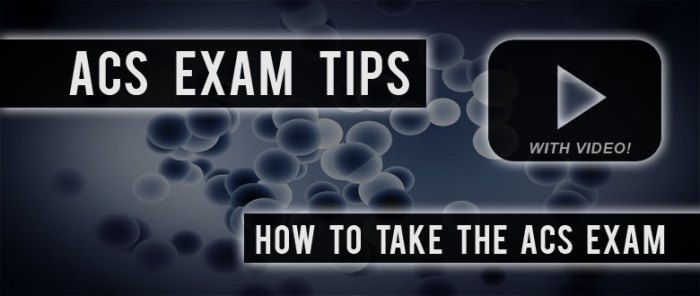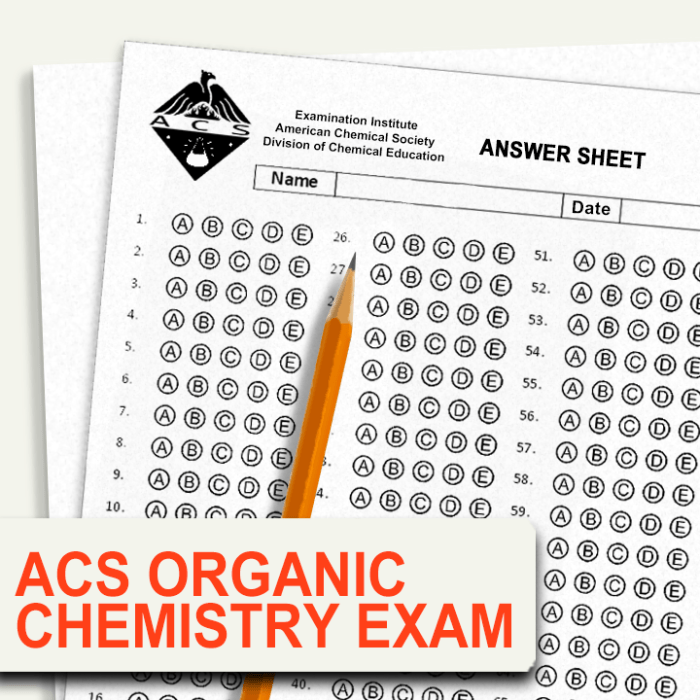Acs practice exam physical chemistry – The ACS Practice Exam for Physical Chemistry is an indispensable tool for students preparing for the American Chemical Society’s Physical Chemistry Exam. This exam assesses students’ understanding of core physical chemistry concepts and their ability to apply them to real-world problems.
This comprehensive guide provides an overview of the ACS Practice Exam for Physical Chemistry, including its structure, format, and key topics covered. It also offers effective study strategies, a review of core concepts, practice problems with detailed solutions, and test-taking strategies to help students achieve success on exam day.
1. Overview of ACS Practice Exam for Physical Chemistry

The ACS Practice Exam for Physical Chemistry is a valuable resource for students preparing for the American Chemical Society (ACS) Standardized Examination in Physical Chemistry. This exam assesses students’ understanding of the core concepts of physical chemistry and their ability to apply these concepts to solve problems.
The practice exam is designed to provide students with a realistic simulation of the actual exam, helping them identify areas of strength and weakness and develop effective study strategies.
Structure and Format of the Exam
The ACS Practice Exam for Physical Chemistry consists of 100 multiple-choice questions covering the following topics:
- Thermodynamics
- Kinetics
- Quantum Mechanics
- Statistical Mechanics
- Spectroscopy
- Electrochemistry
- Surface Chemistry
- Materials Chemistry
The exam is divided into two sections: a morning section (110 minutes) and an afternoon section (170 minutes). The morning section covers the first four topics, while the afternoon section covers the remaining four topics.
2. Study Strategies for Physical Chemistry ACS Exam
Effective preparation for the ACS Practice Exam for Physical Chemistry requires a comprehensive study strategy that focuses on understanding the core concepts of physical chemistry and developing problem-solving skills. Here are some key study strategies to consider:
Understanding Concepts
Thoroughly review the course material, textbooks, and lecture notes to gain a deep understanding of the fundamental principles of physical chemistry. Focus on understanding the underlying concepts rather than memorizing formulas or equations.
Practice Problem-Solving
Practice solving a variety of problems to develop your problem-solving skills. Use practice exams, textbooks, and online resources to find problems that cover the topics tested on the exam. Analyze the solutions to understand the steps involved in solving the problems.
Active Recall
Engage in active recall by regularly testing yourself on the material you have studied. Use flashcards, practice exams, or simply try to recall the concepts and equations from memory. This helps strengthen your understanding and improves your ability to apply the concepts to new problems.
3. Content Review for Physical Chemistry ACS Exam: Acs Practice Exam Physical Chemistry

The ACS Practice Exam for Physical Chemistry covers a wide range of topics in physical chemistry. Here is a brief review of the core concepts tested on the exam:
Thermodynamics
First and second laws of thermodynamics, entropy, free energy, chemical equilibrium, phase transitions
Kinetics
Reaction rates, rate laws, activation energy, catalysis, mechanisms
Quantum Mechanics, Acs practice exam physical chemistry
Wave-particle duality, Schrödinger equation, atomic and molecular orbitals, spectroscopy
Statistical Mechanics
Microstates and macrostates, Boltzmann distribution, partition functions, thermodynamics from a statistical perspective
Spectroscopy
Electromagnetic radiation, absorption and emission spectra, IR, UV-Vis, NMR, mass spectrometry
4. Practice Problems and Solutions

Problem 1
Calculate the standard free energy change for the following reaction at 298 K:
$$\textN_2\text(g) + 3\textH_2\text(g) \rightleftharpoons 2\textNH_3\text(g)$$
Given: $$\Delta H^\circ = -92.4 \text kJ/mol$$ $$\Delta S^\circ = -198.7 \text J/(mol K)$$
Solution
The standard free energy change is given by:
$$\Delta G^\circ = \Delta H^\circ
T\Delta S^\circ$$
Substituting the given values, we get:
$$\Delta G^\circ =
- 92.4 \text kJ/mol
- (298 \text K)(-198.7 \text J/(mol K))$$
$$\Delta G^\circ =
33.2 \text kJ/mol$$
5. Test-Taking Strategies for Physical Chemistry ACS Exam
![]()
Taking the ACS Practice Exam for Physical Chemistry requires effective test-taking strategies to maximize your score. Here are some tips to consider:
Time Management
Manage your time wisely by allocating an appropriate amount of time to each section of the exam. Prioritize answering questions that you are confident about first.
Guessing
If you are unsure about an answer, make an educated guess. The exam does not penalize for incorrect answers, so it is always worth guessing if you have eliminated some of the choices.
Review and Check
After completing the exam, take some time to review your answers and check for any errors. Make sure to double-check your calculations and ensure that you have answered all the questions.
FAQ Section
What is the purpose of the ACS Practice Exam for Physical Chemistry?
The ACS Practice Exam for Physical Chemistry is designed to help students assess their understanding of physical chemistry concepts and identify areas where they need further study.
How should I prepare for the ACS Practice Exam for Physical Chemistry?
Effective preparation for the ACS Practice Exam for Physical Chemistry involves understanding core concepts, practicing problem-solving, and utilizing study resources such as textbooks, online materials, and practice questions.
What types of problems are included on the ACS Practice Exam for Physical Chemistry?
The ACS Practice Exam for Physical Chemistry includes a variety of problems covering key topics such as thermodynamics, kinetics, quantum mechanics, and spectroscopy.
What are some test-taking strategies for the ACS Practice Exam for Physical Chemistry?
Effective test-taking strategies for the ACS Practice Exam for Physical Chemistry include time management, understanding instructions carefully, and reviewing answers before submitting the exam.